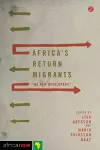
Africa's Return Migrants
2 contributors - Paperback
£25.99
Maria Eriksson Baaz is associate professor at the School of Global Studies, University of Gothenburg, and a senior researcher at the Nordic Africa Institute, Uppsala, Sweden. Her research interests are in African politics, security and development, post-colonial theory and gender. Recently she has focused on masculinity, militarization and defence reform interventions, with a particular focus on the Democratic Republic of the Congo. She is the author of The Paternalism of Partnership: A Postcolonial Reading of Identity in Development Aid (2005). She has also contributed to several edited volumes, such the International Handbook on African Security (2012), and has written numerous policy reports. Additionally, her articles have appeared in leading journals, including International Studies Quarterly, African Affairs, Journal of International Relations and Development, Journal of Modern African Studies, and African Security. Maria Stern is professor in peace and development studies at the School of Global Studies, University of Gothenburg. Her research interests are security studies, the security-development nexus, politics of identity, and feminist theory. Recently she has focused on masculinity, militarization and defence reform interventions, with a particular focus on the Democratic Republic of the Congo. Maria co-edited a special issue on the 'Security-development nexus revisited' in Security Dialogue (2010). She is also co-editor of Feminist Methodologies for International Relations (2006) and the author of Naming Security - Constructing Identity (2005). She has contributed to several edited volumes, such as the International Handbook on African Security (2012), and has written numerous policy reports. Additionally, her articles have appeared in leading journals, including African Affairs, Alternatives, International Journal of Peace Studies, International Political Sociology, International Studies Quarterly, Journal of International Relations and Development, Journal of Modern African Studies, Review of International Studies, and Security Dialogue.